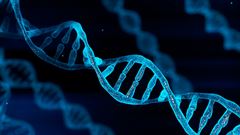 High molecular weight DNA (HMW DNA) samples derived from fibroblasts and induced pluripotent stem cells are now available from the National Institute of General Medical Sciences’ Human Genetic Cell Repository. Housed at Coriell since 1972, the NIGMS HGCR first added high molecular weight DNA to its offerings in 2021, but until now, all such samples were derived from lymphoblastoid cell lines.
High molecular weight DNA (HMW DNA) samples derived from fibroblasts and induced pluripotent stem cells are now available from the National Institute of General Medical Sciences’ Human Genetic Cell Repository. Housed at Coriell since 1972, the NIGMS HGCR first added high molecular weight DNA to its offerings in 2021, but until now, all such samples were derived from lymphoblastoid cell lines.
These HMW DNA samples derived from fibroblasts and induced pluripotent stem cells are now featured in the collection and available for purchase for select lines, and HMW DNA samples can be created from any fibroblast or iPSC samples in the NIGMS HGCR as an on-demand service.
HMW DNA is useful for long-read next-generation sequencing and studies that investigate large-scale genomic variation, such as structural variation. A growing interest in HMW DNA was sparked after recent advances in long-read next-generation sequencing technology, including Pacific Biosciences’ Single Molecule, Real-Time (SMRT®) sequencing and Oxford Nanopore Technologies’ Nanopore sequencing, have made it possible to produce sequence reads of up to 100 kilobases (kb).
This long-read sequencing allows researchers to characterize structural variation in regions of the genome that may be more challenging with other approaches, including inversions, translocations, duplications, and other types of repetitive elements. Additionally, longer sequence read lengths improve the accuracy of haplotype phasing and genome assembly.
Long-read sequencing was also utilized to generate a ‘complete’ sequence of a human genome from a hydatidiform mole cell line in a recent 2021 study, and is currently being utilized by the Human Pangenome Reference Consortium in their efforts to improve, expand, and diversify the human reference genome.
About the Coriell Institute for Medical Research
The Coriell Institute for Medical Research is a globally-recognized leader in biobanking and biomedical research. Coriell is home to one of the world's most important biobanks which distributes biological samples and offers research and biobanking services to scientists around the world. Coriell is the trusted steward of world-renowned collections for the National Institutes of Health, disease foundations and commercial clients. Also a leader in genomic and epigenomic research, Coriell is uncovering the ways our genetic makeup affects our health, especially with regard to cancer, aging, and personalized medicine. Coriell leads or participates in several research partnerships, including the Camden Cancer Research Center and the Camden Opioid Research Initiative. For more information, visit www.coriell.org, like Coriell on Facebook, or follow @Coriell_Science on Twitter.